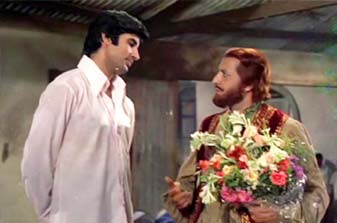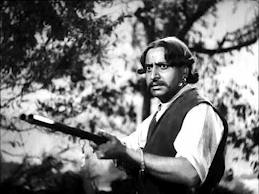Pran, film actor
This is a collection of articles archived because of the excellence Readers will be able to edit existing articles and post new articles directly
|
P R A N | 1 9 2 0 - 2 0 1 3
Avijit Ghosh The Times of India 2013/07/13
Contents |
Early life
Pran was born Pran Krishan Sikand on 12 February 1920, in Ballimaran, Kotgarh, Old Delhi, into a wealthy Punjabi family. His father, Kewal Krishan Sikand, was a civil engineer and a Government civil contractor. His mother was Rameshwari and the couple had four sons and three daughters. Pran was an academically gifted child, especially in mathematics. Since his father had a transferable job, he studied in various places, including Dehradun, Kapurthala, Meerut and Unnao in Uttar Pradesh, and finally completed his matriculation from Raza High School, in Rampur.
First job
During this time, Pran wanted to be a photographer, and he joined A. Das & Co., in Delhi as an apprentice. This job took him first to Simla, where he played the role of Sita to in a local staging of 'Ramlila'. The role of Rama was played by Madan Puri.
Cinema
A chance meeting with writer Wali Mohammad Wali, who was writing a Punjabi film 'Yamala Jat', brought Pran to the world of cinema. He ended up playing the hero in the film, opposite Noorjehan. 'Yamala Jat' became a hit and the pair starred together in their first Hindi film 'Khandaan'.
After Partition, Pran started trying his luck in Mumbai without much success.
With the help of Saadat Hasan Manto and actor Shyam, Pran landed a role in Dev Anand-Kamini Kaushal starrer 'Ziddi'. With the success of the film, Pran never looked back, and played negative roles in 'Madhumati', 'Ram Aur Shyam', 'Munimji' and 'Kashmir Ki Kali'.
Pran went on to work extensively with Dev Anand, Raj Kapoor and Dilip Kumar and is known for his films like 'Aurat', 'Bari Behen', 'Jis Desh Men Ganga Behti Hai', 'Half Ticket', Kashmir Ki Kali', 'Purab Aur Paschim', 'Don' and 'Amar Akbar Anthony'.
Factoids ABOUT PRAN
His first role was as Sita to Madan Puri’s Ram in a local Ramlila in Shimla in 1938.
He wanted to become a photographer and even assisted one in Shimla. A chance meeting with a producer got him his first film, Yamla Jat in Punjabi in 1942.
When he went to Mumbai after Partition, he didn’t get any work. Writer Saadat Hasan Manto recommended the actor for Ziddi (1961) starring Dev Anand and Kamini Kaushal.
From 1969 to 1982, the only actor to be paid more than Pran was Rajesh Khanna. And reportedly, he was paid thrice the fee Amitabh Bachchan got for Don.
He was best friends with Ashok Kumar and of the 27 films they did together, 20 were hits. He was also said to be great friends with Shammi Kapoor, Shashi Kapoor, Dilip Kumar, Manoj Kumar and Kishore Kumar.
According to him, one of his biggest losses during Partition was his dog. Later, he got three dogs, and he named them Bullet, Whisky and Soda.
While shooting for the climax sequence in Bobby, Pran almost drowned in a river. Fortunately, he managed to get hold of a rock and saved himself. Interestingly, Raj Kapoor couldn’t afford the actor’s fee. Pran agreed to a signing amount of 1.
The part in Majboor, when his character views distant things with imaginary binoculars, was a mannerism that was inspired by a director he’d earlier worked with.
At 56, he broke his ankle when he insisted on doing a stunt himself – jumping from a height of 15 feet for a scene in Dus Numbri.
In the early 60s, he played a real hero for Waheeda Rehman, when they were attending a party in Chennai. Some of the revelers got drunk and tried to misbehave with her, and reportedly, Pran came to her rescue.
It is believed, that the first time he was admitted to hospital for ill health was in 1998, when he had a heart problem.
Compiled by Hiren Kotwani
Unbelieveable [negative] social impact
Recalling the magic of Pran, Amitabh Bachchan in a foreword to Pran's biography 'And Pran', wrote, "Onscreen villainy is a thankless job which Pran Saab accepted and carried out with such a degree of perfection that he became the actor the entire nation loved to hate." "That indeed was the measure of his extraordinary success. Parents did not want their children to meet him. Occasionally, he would even be feared and dreaded at public gatherings. Evidently, he came to terms with that, bemused with the power of cinema to influence the audience in a way that sketches only a thin line between the real and the reel."
Such was the magic of his onscreen villainy that people stopped naming their children 'Pran' at the height of his fame! Ironically, while he was feared as a villain on screen, he was a gentleman in real life.
Pran was affectionately called Bollywood's Black Gold!
Pran will be forever remembered for bringing villains on par with the heroes, ruling the industry from 1969 to 1982. He commanded equal money and respect for his negative characters in 'Madhumati', 'Jis Desh Mein Ganga Behti Hai', 'Ram Aur Shyam' and 'Devdas'.
A villain in his own league
Pran was a villain in his own league. He gave a melange of shades to the craft of villainy — he could be evil and lecherous as in Madhumati; suave and scheming (‘Jab Pyaar Kisi Se Hota Hai’), rustic dacoit (‘Jis Des Mein Ganga Behti Hai’) and the comic villain (‘Half-Ticket’). His flair for comedy was also evident in films where he played the good guy such as ‘Victoria No 203’, ‘Jungle Mein Mangal’ and ‘Kasauti’.
Sometimes his role was more prominent and central to a film’s narrative than the hero as in ‘Victoria No 203’ (along with Ashok Kumar) and Dharma.Voice was key to his repertoire. His smooth voice was often used to seduce and abuse gullible girls. With slight modulation, he could also use it to threaten, coax, cajole — anything the role demanded. He even got to croon what became the film’s most popular track:Yaari hai imaan mera (Zanjeer), Daaru ki botal mein (Majboor) and Hum bolega to bologe ke bolta hai (Kasauti).HisqawwaliduelwithBinduin the song, Raaz ki baat keh doon to (Dharma) is what frontbencher’s celluloid dreams are made of.
There was a certain style with which he approached roles. The story, as recounted in Reuben’s biography, goes that he was spotted eating paan in a stylish way–which is why he was handed the role of a villain in his debut film, ‘Yamla Jat’ (1940). Pran was born to a well-heeled family in Old Delhi’s Ballimaran area in 1920. He worked as a photographer’s assistant in Lahore in pre-independence India. Pran would often use a gesture to define a character. In ‘Badi Bahen’, he created cigarette smoke rings. Raka, the dacoit leader of ‘Jis Des Mein Ganga Behti Hai’, would run his hand over his neck, a premonition that the noose was tightening around him. Shata le Shata le Shanno, was his catchline in ‘Kashmir Ki Kali’ where he pronounced the word, s, as, sh. In ‘Majboor’, he used his hands like a binocular, an indication that he was foreseeing danger.
He was also a very conscientious actor who got completely involved in the role.In the climax of ‘Majboor’,his character gets shot in the stomach.During the shooting,Pran kept changing the make-up after every scene to show how life was slowly ebbing away from him. One of his finest perfromance was in Harmesh Malhotra’s Gaddar, where he played BK, the leader of a gang of crookswholives anddiesby his own code of honour. Towards the later partof hiscareer,he also playedthe role of a father in a clutch of multi-starrer superhits such as ‘Dharamveer’ and ‘Amar Akbar Anthony’.
In his foreword toPran’s biography, Amitabh Bachchan gave a glimpse into the private side of the actor. He wrote in 2004, “I gleaned a little-known facet of his during the outdoor shooting spellof ‘Ganga ki Saugandh’.Pran sahib is hugely fond of Urdu poetry and literature. He keeps abreast of all sports events. At one point, he was fond of shikar. He has an encyclopaedic knowledge of sher-o-shayri, folk tales and ribald humour.”
Pran was regarded as a man of principle in the film industry. In 1973,he did not accept the Filmfare award for ‘Beiman’ because he felt that the committee had been unfair in giving the best music director award to Shankar Jaikishan and not Ghulam Mohammed for his music in ‘Pakeezah’.
Ballimaran remembers its famous son
Later in life, even after he had become a famous film actor, Pran visited the narrow lanes of Katra Neel. Pran lived near Novelty cinema. His father was a well-off businessman. His father Kewal Krishan Sikand was a popular figure. TNN
MY NAME IS PRAN
Pran Krishan Sikand
Born in 1920 in Delhi into a wealthy Punjabi family, Pran started his career in 1940
He first ventured into photography but a chance meeting with a film producer got him his first role in ‘Yamla Jat’
He acted in several films, his base being Lahore in undivided India
His career experienced a brief pause due to the Partition in 1947
Subsequently, he moved to Bombay
With the help of writer Saadat Hasan Manto and actor Shyam, Pran got a break in the Bombay Talkies film ‘Ziddi’
THE HONOURS
The veteran film actor was the 44th Dadasaheb Phalke Award (2012) winner The award is conferred by the government for outstanding contribution to the growth and development of Indian cinema
Previous awardees include Satyajit Ray, Dev Anand and Yash Chopra
He received the award on May 10, 2013, which officially marks Indian cinema’s 100th year
Pran was a recipient of many awards, including the Filmfare Lifetime Achievement Award (1997)
He was also honoured with the Padma Bhushan (2001)
FAMOUS DIALOGUES
Sher Khan ne shaadi nahi ki to kya hua... lekin baaraatein bahut dekhi hai (Zanjeer)
Is ilaaqe mein naye aaye ho sahab?... varna Sher Khan ko kaun nahin jaanta (Zanjeer)
Tumhara Baap Raaka (Jis Desh Mein Ganga Behti Hai)
Yeh Kaun Hai Kishorilal (Biraj Bahu)
Awards
The actor won the Filmfare award for Supporting Actor thrice for 'Upkar', 'Aansoo Ban Gaye Phool' and 'Beiman'. In 1997, Pran was also graced with the Filmfare Lifetime Achievement award. In 2001, he was honoured with the Padma Bhushan and in 2010 he was conferred with the Phalke Icon by the Dadasaheb Phalke Academy.
SOME OF PRAN’S MEMORABLE FILMS
Khandan (1942) Ziddi (1948) Sindbad The Sailor (1952) Chori Chori (1956) Azad (1955) Devdas (1956) Halaku (1956) Tumsa Nahin Dekha (1957) Madhumati (1958) Raj Tilak (1958) Jis Desh Mein Ganga Behti Hai (1960) Half Ticket (1962) Kashmir Ki Kali (1964) Shaheed (1965) Ram Aur Shyam (1967) An Evening In Paris (1967) Upkar (1967) Aurat (1967) Sadhu Aur Shaitaan (1968) Brahmachari (1968) Nanha Farishta (1969) Johnny Mera Naam (1970) Heer Ranjha (1970) Purab Aur Paschim (1970) Victoria No. 203 (1972) Parichay (1972) Dharma (1973) Zanjeer (1973) Bobby (1973) Majboor (1974) Amar Akbar Anthony (1977) Don (1977) Naseeb (1981) Souten (1983) Sharabi (1984) Sanam Bewafa (1990) Isi Ka Naam Zindagi (1992) 1942: A Love Story (1994) Tere Mere Sapney (1996)
NEGATIVE ROLES
Navrangi (Khandan) | Raka (Jis Desh Mein Ganga Behti Hai) | Changez Khan (Halaku) | Killedar Karan Singh (Baradari) | Chhote Choudhary (Heer Ranjha)
POSITIVE ROLES
Pyaarelal (Kasauti) | Sher Khan (Zanjeer) | Malang (Upkaar) | JJ (Don) | Rana (Victoria No 203)


